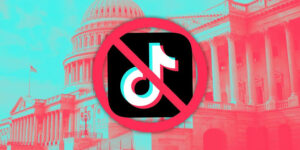
“The TikTok Dilemma: the US Really Ban(**g) the App?”
TikTok, the wildly popular video-sharing app, has found itself in the crosshairs of US policymakers in recent years. Concerns over data privacy and national security, particularly due to its Chinese ownership by ByteDance, have fueled discussions about potentially banning the app in the United States. But as this proposal looms, what are the chances of it actually happening, and what sets it apart from previous attempts to regulate TikTok?
With over 100 million active users in the US alone, TikTok has become an integral part of American social media culture. Its ability to capture the attention of users with short-form videos and viral trends has made it a dominant force in the digital landscape. However, its ownership by a Chinese company has raised eyebrows among US lawmakers, who worry about the security implications of American user data being in the hands of a foreign entity.

The Trump administration was the first to take concrete steps towards banning TikTok in the US. Former President Donald Trump issued executive orders seeking to ban TikTok unless it was sold to an American company. The orders cited national security concerns and alleged that TikTok was collecting data on US users for the Chinese government. However, these efforts were met with legal challenges, and TikTok was able to continue operating in the US.
Under the Biden administration, the scrutiny of TikTok has persisted. President Joe Biden signed an executive order calling for a review of apps with ties to foreign adversaries, including TikTok. This renewed focus on national security and data privacy has reignited discussions about the potential for a TikTok ban.
Despite the push for a ban, several factors complicate the implementation of such a measure. TikTok’s immense popularity among American users makes it a challenging target for regulation. Any attempt to ban the app would likely face backlash from consumers and the tech industry, as well as legal challenges questioning the legality and evidence supporting national security concerns.

Furthermore, the global nature of TikTok’s operations presents logistical challenges for a US ban. Even if TikTok were banned from US app stores, users could still access the app through VPNs or other means, undermining the effectiveness of the ban.
As policymakers weigh the risks and benefits of a TikTok ban, the debate over its future continues. The outcome of this debate will have significant implications for data privacy, national security, and the regulation of social media platforms in the United States.
Leave a Reply